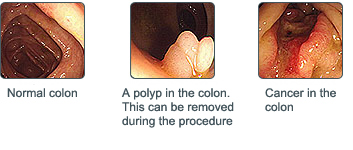Colorectal cancer can be prevented
Colorectal cancer takes time to develop and goes through different stages of polyp growth. Detection and removal of early-stage polyps can prevent cancer from developing. Even when cancer has developed, treatment of early-stage cancer has a very high success rate. Regular colon check-ups are essential in preventing colorectal cancer.
Testing and screening
A faecal occult blood test (FOBT) is a simple test where a stool sample is collected at home before being sent for laboratory testing. The test checks for hidden blood in stool samples, which can be a sign of cancer, polyps or other internal disorders.
A flexible sigmoidoscopy is a procedure using a flexible, narrow tube with a light and tiny camera on one end to inspect the interior walls of the rectum and the lower colon.
A colonoscopy is a similar procedure to a flexible sigmoidoscopy, except that the flexible tube is long enough to view the entire colon.
A double-contrast barium enema is an X-ray examination that allows a radiologist to view the entire colon.

Detecting and treating cancer early and removing precancerous colorectal polyps helps reduce the number of deaths from colorectal cancer.
Recommended screening intervals
Doctors recommend regular screening for all adults aged 50 or above.
There are many options, depending on your budget and personal situation. For more information or medical advice, please consult your doctor.
The following is a guide to the recommended screening intervals:
Faecal occult blood test (FOBT): every 5 years
Flexible sigmoidoscopy: every 5 years
Double-contrast barium enema: every 5 years
Colonoscopy: every 10 years
High-risk individuals (those with a personal or family history of colorectal cancer or polyps) should begin screening at an earlier age and may need to be screened more frequently. Consult your doctor for recommendations on this.

